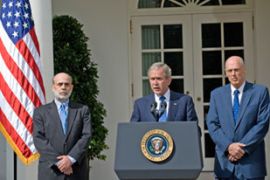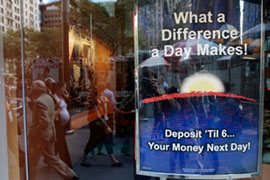Taxpayer cash to bail out US banks
US treasury plans to use up to $800bn of taxpayers’ money to buy banks’ bad debts.

“We must now take further, decisive action to fundamentally and comprehensively address the root cause of our financial system’s stresses,” Paulson said.
“We’re talking hundreds of billions [of dollars]. This needs to be big enough to make a real difference and get at the heart of the problem.”
Tough talk
Steny Hoyer, the Democratic leader in the House of Representatives, said the chamber would probably take up a bill to implement the plan early next week.
Nancy Pelosi, the House speaker, said lawmakers would stay in town past their hoped-for adjournment next Friday, if needed, in order to pass it.
But while stock markets rose in expectation of aggressive government action, critics called for stronger action against those whose actions have led to the crisis.
“What we need is not just a bail out, but a jail-out,” Danny Schechter, a filmmaker and author specialising in the US economy, told Al Jazeera.
“We need the prosecution of wrongdoers because these people took advantage of so many people who are [now] facing the loss of their homes and the loss of their hope.”
He said: “First, it’s the greed of the Wall Street firms … but right behind are the regulators who didn’t regulate [and] also our media, which didn’t blow the whistle and didn’t investigate these sub-prime and sub-crime transactions.”
Stock markets soar
A Treasury official said that hedge funds and non-US financial institutions would not be allowed to offload their troubled assets onto American taxpayers under the plan.
The White House said it was too soon to say how the plan would impact the nation’s debt, and said it was possible many of the funds could be recovered as markets stabilise and bad assets are sold off.
 |
| Investor confidence appears to have grown amid government tough talk [AFP] |
US stocks closed higher on Friday, on top of gains on Thursday, following Paulson’s comments. The blue chip Dow Jones industrial average closed up 368 points, or 3.4 per cent.
At a meeting with congressional leaders on Thursday night, Paulson and Ben Bernanke, the US federal reserve chairman, made the case for aggressive action to try and control events that could devastate an already weak economy.
Bernanke again warned legislators on Friday that “… if Congress doesn’t act soon, there will be an economic meltdown,” a congressional aide said.
Michelle Smith, a spokeswoman for the US federal reserve, confirmed only than Bernanke had painted “a dark scenario”.
The plan is reminiscent of the Resolution Trust Corp (RTC), a government agency set up to help the nation out of the savings and loan crisis in the 1980s.
The RTC took whole institutions under its wing, but the new fund under discussion would remove bad assets from the balance sheets of financial institutions to help revitalise them.
Parties divided
In the US presidential race, John McCain, the Republican presidential hopeful, crticised the US Treasury for taking a haphazard approach to the crisis, while Barack Obama, his Democratic rival, supported the latest moves.
The Treasury also said on Friday that it would siphon up to $50bn from a fund established in the 1930s to conduct foreign exchange market intervention to support the US money market mutual fund industry.
The industry, a long-safe corner of financial markets and home to about $3.5 trillion of deposits, has increasingly appeared at risk of falling victim to the year-old credit crunch.
A panic in money markets set in on Tuesday, when the Reserve Primary Fund, a fund whose assets had tumbled 65 per cent in recent weeks, fell below $1-a-share in net asset value.
The drop was triggered as a result of losses on debt issued by Lehman Brothers, the US investment bank that filed for bankruptcy last week in one of the most high profile crashes of the current financial crisis.